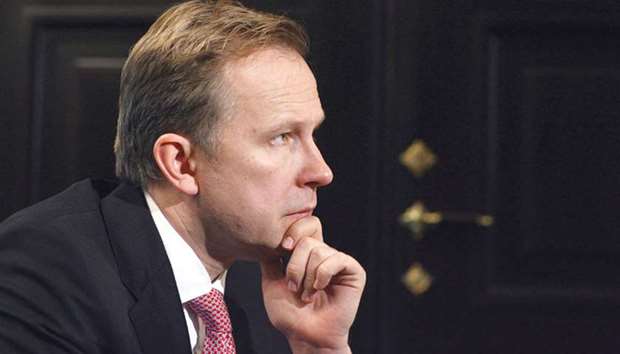The embattled head of Latvia’s central bank denied seeking bribes and accused two of the country’s lenders of conspiring against him as the crisis engulfing the Baltic nation’s banking system deepened.
“I have taken the decision not to resign,” Ilmars Rimsevics, the Bank of Latvia’s governor and representative to the European Central Bank, told reporters at a press conference in Riga yesterday. “I am not guilty.”
The Latvian government has repeatedly urged Rimsevics to step aside after the anti-corruption agency detained him over the weekend on suspicion of securing bribes.
Rimsevics, who was released on bail and hasn’t been formally charged, alleged that the accusations were part of an effort to undermine him and said he has received death threats.
The governor, who’s led the Latvian central bank since 2001, may be protected by the institution’s independence. The latest allegations, first reported by the Associated Press, concern Norvik Banka JSC, which is controlled by Grigory Guselnikov, a Russian-born UK citizen.
Norvik detailed the accusations in a 39-page complaint to a World Bank arbitration body. The document, obtained by Bloomberg News, didn’t name him, referring only to a “very high-level, senior Latvian public official.” The chief executive officer of Norvik bank, Oliver Bramwell, said this official is Rimsevics.
The complaint against Latvia, filed in December, also alleged that the Latvian banking regulator had retaliated against Norvik for the refusal to pay the bribes over a two-year period to late 2017.
The bribery probe into the central bank chief is just a piece of the widening financial scandal in Latvia, a nation of two million that’s faced repeated questions over its role as a hub for money-laundering. Just last week, the US Treasury Department proposed to ban ABLV Bank SA, the nation’s third-largest lender, from the US financial system, saying it helped entities allegedly linked to North Korea’s missile programme and institutionalised money-laundering as a “pillar” of its business.
The latest allegations have put the government in a tight spot. While Prime Minister Maris Kucinskis has called for Rimsevics to step down, he also accused Norvik yesterday of seeking to undermine the integrity of the country’s financial system. Norvik must present evidence of its allegations, Kucinskis said yesterday.
“There is reason to think that this is more likely Norvik Bank’s and Mr Guselnikov’s attempt to harm the state’s image,” Kucinskis told reporters in Riga. “Anyone can submit legal evidence or turn to the relevant authorities and inform them about violations, including payments or demands for bribes. At the moment, none of Norvik Bank’s representatives have submitted any evidence to any relevant authority.”
Rimsevics accused a group of banks of trying to undermine him, deceiving law enforcement and regulators. Just hours after he denied a loan from the central bank to ABLV on February 16, his office and house were searched by Latvian authorities, he said.
The central banker also said he received a text message at the end of last month threatening that he would be shot, and informed law enforcement officials. Gulselnikov has demanded €200mn to leave Latvia and give up his bank, Rimsevics claimed. “I have no doubt that these banks are co-ordinating among themselves against me and the state of Latvia,” he said.
Guselnikov hit back at Rimsevics, who was deputy governor of the central bank from 1992 before taking over the helm in 2001.
“Now the regulator is trying to pretend there was no corruption. It’s clear he was at the top of it, without him nothing would have happened,” the Russian-born banker said by phone from London. “For 25 years Rimsevics has been directing things.”
Latvia’s Corruption Prevention and Combating Bureau, which detained Rimsevics, said it had begun criminal proceedings against a “a top-level public official” of the country’s central bank. It’s investigating “an alleged solicitation and acceptance of a bribe” of at least €100,000, it said in a statement.
Rimsevics, 52, was released late on Monday following 48 hours in custody after his friend put up a €100,000 bail, local media reported. He’s the longest-serving head of a national bank on the ECB’s Governing Council, which he joined in 2014 when Latvia adopted the euro.
As governor, Rimsevics enjoys robust independence. Deputy Governor Zoja Razmusa will fill in for him while he’s not at the bank, a spokesman said on Sunday.
Finance Minister Dana Reizniece-Ozola said her country’s reputation was suffering because of the scandals. Her ministry has changed its borrowing strategy and will refrain from refinancing operations in the near term, she said, adding that Latvia asked the US Treasury to discuss and share data on the ABLV.
While the lender denied the US charges, the ECB slapped a payment moratorium on the lender on Monday. The bank has seen an outflow of €600mn in both deposits and securities since the Treasury report, Peters Putnins, chairman of Latvia’s Financial and Capital Markets Commission, said in an interview with public broadcaster yesterday. “Most” of information in the Treasury report was known to the regulator, he said.
Latvia’s benchmark stock gauge, the OMX Riga Index, fell 0.1% to 1,021.337 yesterday after dropping 0.9% the day before.
To shake off accusations that its lenders hold wealth with questionable origins, Latvia’s financial regulator has fined three banks for handling accounts that were involved in a $1bn Moldovan fraud in 2014. Five Latvian banks — including ABLV — agreed last year to fines for failing to perform adequate due diligence and gather sufficient information on transactions and beneficiaries of deals linked to North Korea.

Ilmars Rimsevics, Latvia’s central bank governor, speaks during an interview in Riga. Rimsevics, who was released on bail and hasn’t been formally charged, alleged that the accusations against him were part of an effort to undermine him and said he has received death threats.
